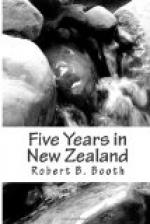We possessed no weapons but our pocket knives, and they would be of small use against so powerful a brute as a wild sow in defence of her young. The dogs shirked her neighbourhood altogether. At length, in our extremity, we were struck by the idea that we might strangle her with one of the tether ropes carried around the horses’ necks. We unloosed one, and each taking an end thirty feet apart, approached to the encounter. To our amazement and joy the sow herself here contributed in a quite unexpected manner to her own capture. Immediately the rope was within her reach she snapped viciously at it, and retained it in her mouth. Discovering that she persisted in holding on, and that the rope was far back in her jaws, we shortened hand rapidly, and ran round, crossing each other in a circle, keeping the rope taut meanwhile. By this means we quickly twisted the rope firmly over her snout, so that had she now desired she could not have rid herself of it. The rest was easy; we shortened hand till near enough to despatch her with our clasp knives. We cut up the beast and carried off as much of the meat as would last us some days, and that night supped sumptuously off pork chops.
[Illustration: KILLING THE WILD SOW.]
After ten days of this very undesirable existence, Mr. Lee arrived and informed us that the Inspector would be up on the morrow. Very welcome news; and we were further gladdened by a fresh supply of the necessaries of life which Mr. Lee had brought on a led pack horse. The delay was owing to the Inspector having been called away to a distant part of Canterbury, and Mr. Lee had a ride of nearly a hundred miles to find him.
In those days the postal arrangements were very primitive. Once a week only the mails were carried, and some stations distant from the line of route were obliged to send a horseman 20 to 50 miles to fetch their post.
The sheep were safely crossed on the third day, and we started afresh for Christchurch.
We had up to this time been more than a month on the journey, at the hottest season, without a tree to shelter us and with only the bare ground for a bed. One blanket and one change of clothes had I. Campbell, I think, had not so much. For a part of the time mutton and water seasoned with dust was our food, and the open sky our covering day and night; however, we were none the worse for it, and to a certain extent I enjoyed the life, for had I not then rude health and a splendid constitution, which subsequently carried me safely through rougher, if not more enjoyable, experiences than driving sheep.
The rest of the journey was comparatively easy, and fifteen days saw us in Christchurch with the sheep in excellent condition. Here I found letters from home awaiting me, those from my father and mother almost insisting on my return and to resume my studies. This was due to the accounts given them by C——, for I took special care to write in glowing terms of everything. The letter had, however, no effect towards altering my determination to stay in New Zealand.




